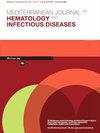b 细胞急性淋巴细胞白血病的 car-t 细胞疗法
IF 2
4区 医学
Q3 HEMATOLOGY
Mediterranean Journal of Hematology and Infectious Diseases
Pub Date : 2024-01-01
DOI:10.4084/mjhid.2024.010
引用次数: 0
摘要
治疗难治性和复发性(R/R)B 型急性淋巴细胞白血病(B-ALL)是儿童和成人尚未满足的医疗需求。过去二十年的研究表明,表达嵌合抗原受体(CAR-T)的自体 T 细胞是治疗这类患者的有效技术。B细胞上表达的抗原,如CD19、CD20和CD22,是适合治疗R/R B-ALL患者的靶点。CD19 CAR-T 细胞在儿童和成人 R/R B-ALL 患者中诱导的完全缓解率很高(80-90%)。然而,尽管这种反应率令人印象深刻,但约有一半有反应的患者在接受 CAR-T 细胞治疗后 1-2 年内复发。CAR-T细胞治疗后的allo-HSCT可能会巩固CAR-T的疗效并提高长期疗效;然而,并不是所有采用allo-HSCT作为巩固治疗策略的研究都显示了移植带来的益处。 对于allo-HSCT后早期复发的B-ALL患者,或T细胞数量不足以进行自体治疗的患者,使用原始干细胞捐献者的T细胞为成功生成CAR-T细胞和有效的治疗方法提供了机会。 最后,最近的研究引入了从健康供者或未配型者中产生的异体CAR-T细胞,并对其进行了适时的基因编辑处理,以降低免疫不相容的风险,取得了良好的治疗效果。 关键词CAR T;急性淋巴细胞白血病;异体 CAR-T;自体 CAR-T。本文章由计算机程序翻译,如有差异,请以英文原文为准。
CAR-T CELL THERAPY IN B-CELL ACUTE LYMPHOBLASTIC LEUKEMIA
Treatment of refractory and relapsed (R/R) B acute lymphoblastic leukemia (B-ALL) is an unmet medical need in both children and adults. Studies carried out in the last two decades have shown that autologous T cells engineered to express a chimeric antigen receptor (CAR-T) represent an effective technique for treating these patients. Antigens expressed on B-cells, such as CD19, CD20, and CD22, represent targets suitable for treating patients with R/R B-ALL. CD19 CAR-T cells induce a high rate (80-90%) of complete remissions in both pediatric and adult R/R B-ALL patients. However, despite this impressive rate of responses, about half of responding patients relapse within 1-2 years after CAR-T cell therapy. Allo-HSCT after CAR-T cell therapy might consolidate the therapeutic efficacy of CAR-T and increase long-term outcomes; however, not all the studies that have adopted allo-HSCT as a consolidative treatment strategy have shown a benefit deriving from transplantation. For B-ALL patients who relapse early after allo-HSCT or those with insufficient T-cell numbers for an autologous approach, using T cells from the original stem cell donor offers the opportunity for the successful generation of CAR-T cells and for an effective therapeutic approach. Finally, recent studies have introduced allogeneic CAR-T cells generated from healthy donors or unmatched, which are opportunely manipulated with gene editing to reduce the risk of immunological incompatibility, with promising therapeutic effects. Keywords: CAR T; Acute Lymphoid Leukemia; Allogeneic CAR-T; Autologous CAR-T.
求助全文
通过发布文献求助,成功后即可免费获取论文全文。
去求助
来源期刊

Mediterranean Journal of Hematology and Infectious Diseases
Medicine-Hematology
CiteScore
4.20
自引率
6.20%
发文量
113
审稿时长
12 weeks
期刊介绍:
Reciprocal interdependence between infectious and hematologic diseases (malignant and non-malignant) is well known. This relationship is particularly evident in Mediterranean countries. Parasitosis as Malaria, Leishmaniosis, B Hookworms, Teniasis, very common in the southeast Mediterranean area, infect about a billion people and manifest prevalently with anemia so that they are usually diagnosed mostly by experienced hematologist on blood or bone marrow smear. On the other hand, infections are also a significant problem in patients affected by hematological malignancies. The blood is the primary vector of HIV infection, which otherwise manifest with symptoms related to a reduction in T lymphocytes. In turn, infections can favor the insurgency of hematological malignancies. The causative relationship between Epstein-Barr virus infection, Helicobacter pylori, hepatitis C virus, HIV and lymphoproliferative diseases is well known.
 求助内容:
求助内容: 应助结果提醒方式:
应助结果提醒方式:


